Rows 1 & 2 (Full Page Advertisements):
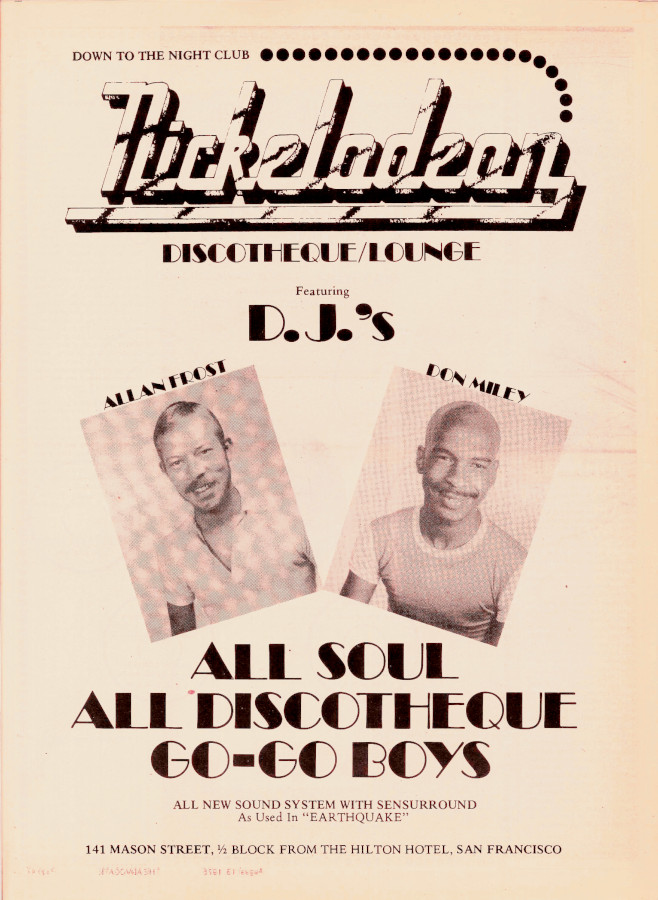
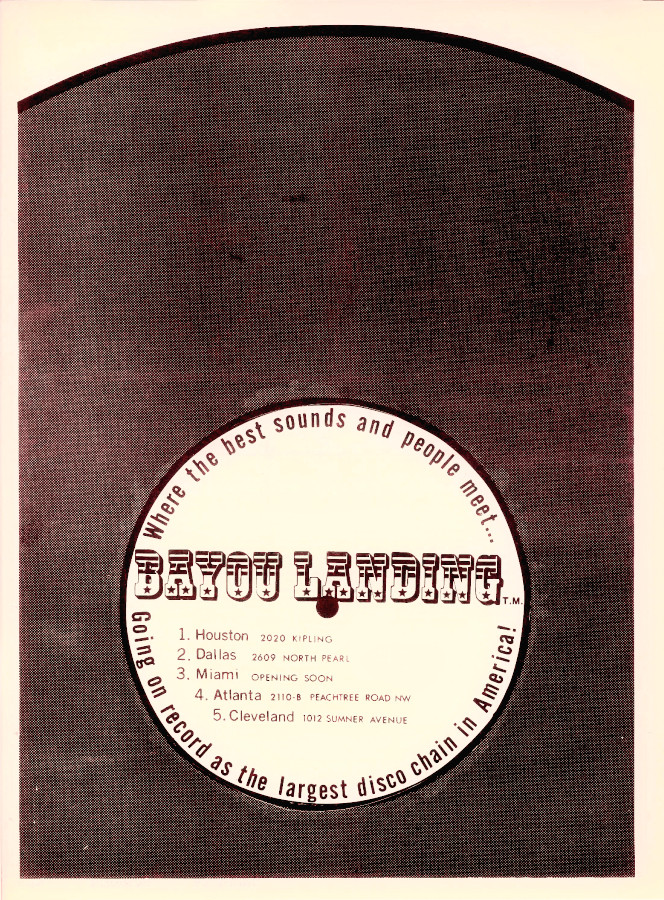



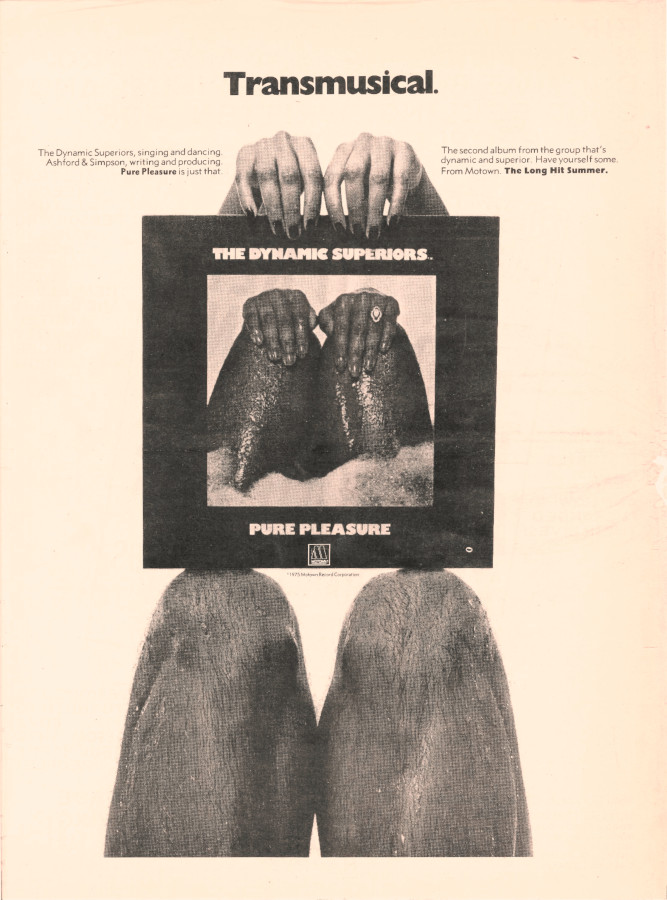
1. Nickelodeon (141 Mason St., San Francisco, CA): This venue got a brief mention in Bob Kiggins' San Francisco Disco Scene column, as a place "where boys can be girls." Interesting as a document of burgeoning disco DJ culture for an establishment to feature their music and sound above anything else - "ALL SOUL, ALL DISCOTHEQUE," with the names and photos of their DJs - Allan Frost and Don Miley front and centre. Not sure how many other discos would employ Universal Studios’ Sensurround system (first used on the 1974 film Earthquake) but they made sure to include that in the ad too. Don Miley would go on to have credits as a writer and/or mixer on records coming out of, or connected to the San Francisco scene, like "Tell Everybody" and "Doin' It" by Herbie Hancock, and "Get The Feeling" by the Two Tons O' Fun. Miley also appears to have been one-time DJ and singer Frank Loverde's manager in the early 80s.
2. Bayou Landing
(2020 Kipling, Houston, TX)
(2609 North Pearl, Dallas, TX)
(2110-B Peachtree Road NW, Atlanta, GA)
(1012 Sumner Avenue, Cleveland, OH): A chain of gay bars and discos in the US south and midwest ran by entrepreneur Dennis Sisk and business partner Tony Caterine that seems to have rose as quickly as it fell. Another half-page ad in the issue (see The Supremes Interview) advertises the opening of their newest Cleveland location. Some of it's branches became independent gay venues, like the one in Houston, which became The Old Plantation (probably not long after this ad was printed). Though one would question the inclusivity of a name like that today, The Old Plantation would spawn a mini-chain of its own. Dallas' D Magazine has a fascinating archived piece from 1979 called Lords of an Underground Empire which in part, details the rise of The Old Plantation(s) in both Dallas and Houston and the decline of Bayou Landing chain, with its founders, Sisk and Caterine ending the decade embroiled in drug and fraud charges.
3. Farmhouse (2710 Albany, Houston, TX): Dubbed "Houston's Number One Super-Bar," it doesn't seem to have been an exaggeration judging from the photo in the ad. Originally an orphanage called the DePelchin Faith Home, it became The Rams Club, a private elite supper club venue before becoming The Farmhouse. Showing just how perilous it could be owning a gay establishment at this time, The Farmhouse seems to have survived an arson the year before. It would be home to many different (and mostly gay) nightspots until 2001. Now a Texas historical landmark, it is currently a condo complex called Villa Serena.
4. Lost and Found (56 L Street S.E., Washington, DC)
Pier 9 (1824 Half Street S.W., Washington DC): A full-page shared between two Washington D.C. venues, both owned by Bill Bickford and Don Culver. Established in 1970, Pier 9 was one of the first major gay disco venues in DC. It had a certain claim to fame early on for its telephone service between tables, an innovation designed to skirt restrictive local liquor laws. Located in a warehouse district right across from a power plant, its out-of-the-way location perhaps only bolstered its appeal. Most recently, it was the site of Ziegfield's/Secrets which only recently closed, with the site slated for demolition.
Less out of the way, Lost & Found opened a year after the Pier, however it came under fire shortly after due to controversy around its door policies, said to exclude black, female and drag customers. Lost & Found lasted until the 1990s and remained a queer venue for some time after. Today the site appears to have become a condo complex.
5. Ball Express (4025 Pacific Coast Highway, San Diego, CA): Housed in a former airplane hangar, the suggestively named Ball Express was apparently the first and biggest gay disco in San Diego and by various online accounts, the place to be in San Diego’s gay scene in the ‘70s. Gloria Gaynor, Eartha Kitt and Sylvester are all said to have played there. Ball Express is one of the establishments mentioned in the documentary about San Diego’s Gay Bar History aired by San Diego’s PBS affiliate, KPBS. The venue appears to have lasted from around 1974-1978, reportedly done-in as a result of “storm damage to the roof and slow weeknights.” See an amusing review from 1976 in the San Diego Reader calling it “a segregated in-spot” worth going to for “loosening screws in one’s perspective.”
6. Ad for The Dynamic Superiors' Pure Pleasure (1975, Motown): Led by the openly gay singer Tony Washington, they were undoubtedly one of the most progressive acts on Motown at the time. Much of their material (including the advertised album) was written and produced by Ashford & Simpson. Queer Music History has scans of some of their press from the time, including an interview With Washington from a later issue of The Advocate. Sadly, Washington is said to have succumbed to AIDS in the late 1980s, though there's little official confirmation or details, including from the current lineup's website.
Row 3 :
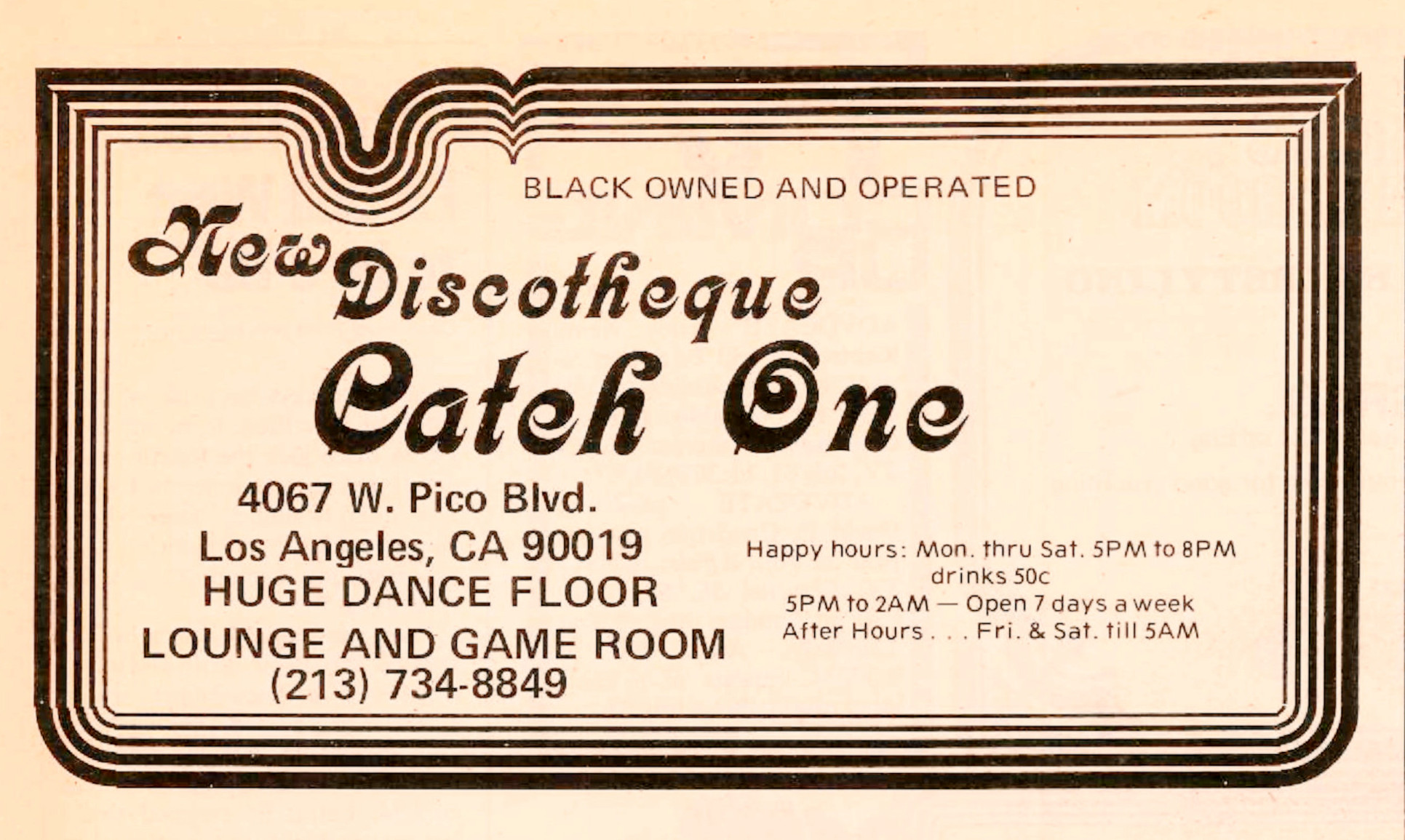

1. Catch One (4067 W. Pico Blvd., Los Angeles, CA): One of the first black, gay discos in the US and one of the longest running, it is also the only venue advertised here to spawn its own finished documentary. Established in 1973 by Jewel Thais-Williams who saw an underserved market for gay women and queer people of colour like her who often faced discrimination in the larger West Hollywood gay venues. Directed by C. Fitz, the documentary Jewel's Catch One is not only about the disco, but Thais-Williams' work as community activist and healer and how integral "The Catch" was in her efforts. In 2015, Thais-Williams sold Catch One in order to focus on her non-profit, the Village Health Foundation, established next-door to the disco. Catch One is still open today under new management.
2. Man's Country (5015 N. Clark St., Chicago, IL): Established in 1973 by Chuck Renslow, a leading figure in Chicago's gay community and his partner, the artist Dom Orejudos, Man's Country was something of a legendary institution in Chicago. In business for 44 years, like many older bathhouses its profitability and upkeep had noticeably suffered in its waning years. At its peak, Man's Country was in the same league as other megaplex bathhouses of its time, which envisioned themselves as all-around entertainment venues. Its Music Hall, featured in this ad, was described in a Windy City Times article as its "crowning achievement." In an interview with The Advocate, Renslow's surviving partner, Ron Ehemann said "[i]f you were an entertainer trying to break into one of the bigger rooms downtown and they weren’t paying attention to you, you could play Man’s Country and the Tribune and Sun-Times would come here and review you.” Acts like The Village People, Grace Jones, Divine, Boy George and countless others would grace its stage. Attempts to sell the business in recent years were unsuccesful, eventually the property was sold and demolished. A condo development bearing Renslow's name was planned, however it appears those plans have since fell through.
Rows 4 & 5:


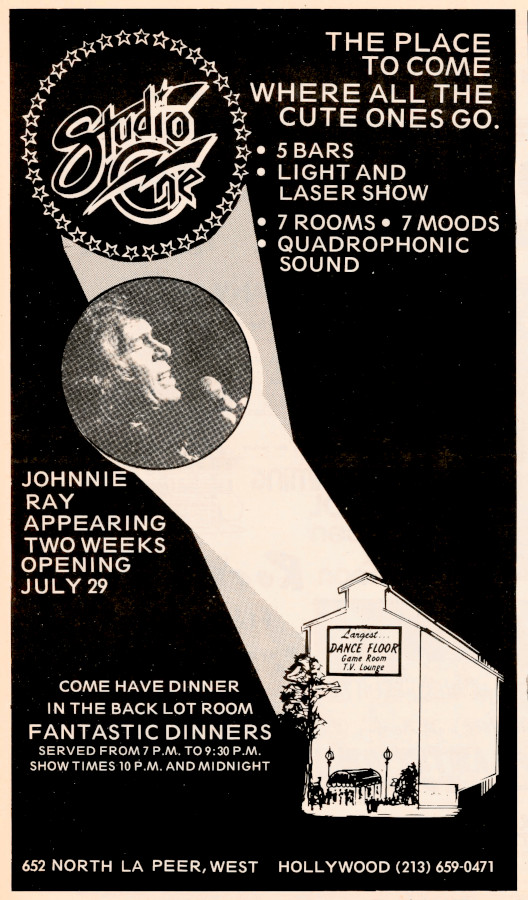
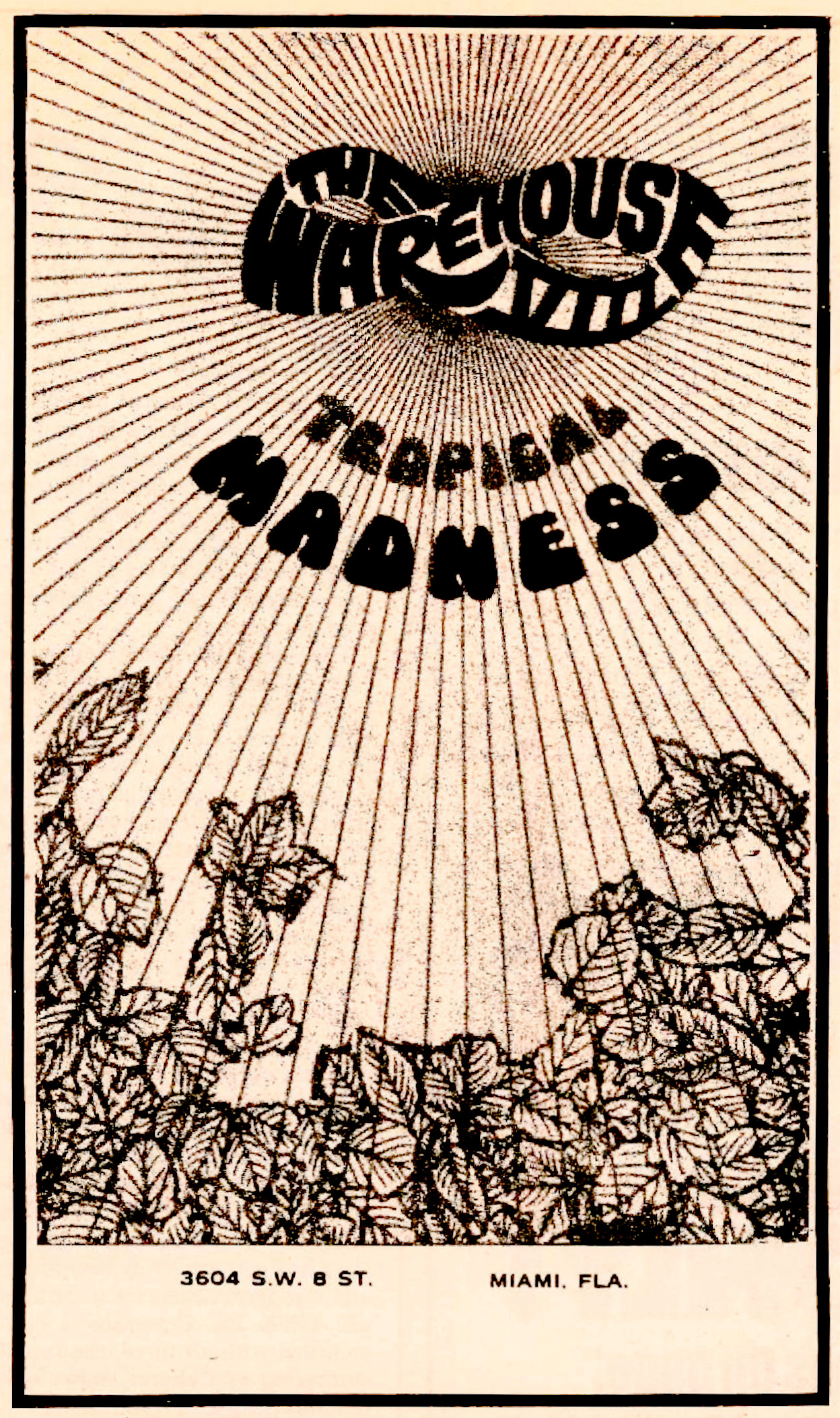
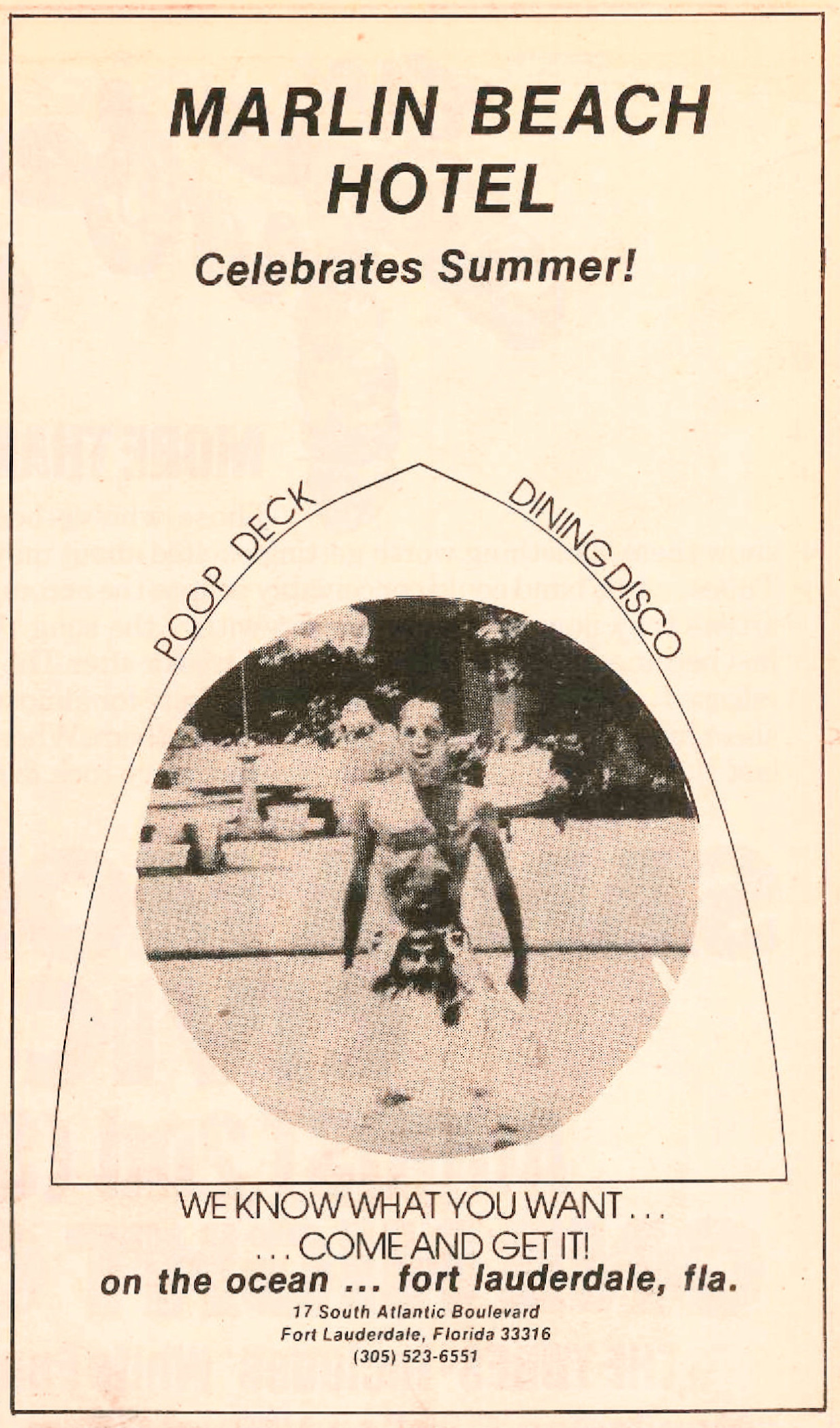



1. The Record Depot (1604 N. Highland Ave., Hollywood, CA): A Record store that, judging from its ads and mentions elsewhere, was perhaps LA's premier record retailer, specializing in disco. A column in the February 12, 1977 issue of Billboard notes that Record Depot was even given an award from the Southern California Disco DJ Association. Interesting to note the popular disco acts which they list as well as the artwork, taken from The Pointer Sisters' Steppin’ LP. The site was home to recording and rehearsal studios until a recent re-development.
2. Our Den AKA Den One (1355 N. Wells, Chicago, IL): Located in Chicago's Old Town neighbourhood, which had at one time been Chicago's "gay ghetto," this is perhaps one of the most notable venues listed here. A gay venue catering to a mixed black and white clientele; for that alone, Den One appears to have been something of an anomaly in the Chicago scene. In 1977, 19 year-old House pioneer and legend Ron Hardy would establish his first DJ residency at Den One (see Jacob Arnold's excellent article about Ron Hardy's Den One residency at RBMA). At the time of this ad however, its DJ was Artie Feldman, a regular Chicago contributor to Vince Aletti's Disco File columns in Record World. By 1978, it would become Carol's Speakeasy, named after its owner Richard Farnham AKA Mother Carol. Its closure in 1991 appears to have been precipitated by its unfortunate connection to serial killer Jeffrey Dahmer, when it was found that Dahmer picked up one of his victims, 23 year-old Jeremiah Weinberger there. Even as the neighbourhood gentrified around it, 1355 N. Wells would remain abandoned until around 2016 or so, the last time the building appears on Google Street View. By 2017, the building appears to have been demolished.
3. Studio One (652 N. La Peer, West Hollywood, CA): Wrote much more about Studio One and its decidedly mixed legacy in my preamble to the Disco Scenes columns from this issue. What I find most intriguing about this ad however is the advertisement for Johnnie Ray's appearance there, likely at its popular cabaret venue, The Backlot. Someone I hadn't known of until I saw this ad, Johnnie Ray is an interesting figure in queer pop cultural history. Hearing impaired from a young age, Ray was something of a Rock & Roll pioneer, having come up playing black establishments like Detroit's Flame Show Bar, where he was known for his emotive, theatrical style. Though never 'out' in the quasi-official way we think of today, his queerness remains widely acknowledged. If nothing else, signature songs like "Cry" and "Hernando's Hideaway" certainly speak to decidedly queer themes and audiences. Battling alcoholism throughout much of his adult life, Johnnie Ray died of liver failure in 1990 at the age of 63.
4. Warehouse VIII (3604 S.W. 8th St., Miami, FL): According to an article from The South Florida Gay News, this was the centre of the action in Miami's gay bar scene in the mid 70s. True to its name, the venue was a former warehouse, which according to one description "boasted a huge dance floor, a Levi-leather bar in the back, a cruise bar upstairs, and a rooftop where anything could happen." When Miami-Dade County was the centre of Anita Bryant's anti-gay Save Our Children campaign, The Warehouse 8 became a major meeting place for activists (and target of homophobes). Owned by Bob Stickney, who also owned another, smaller gay venue in Miami called The Candlelight Club.
5. Marlin Beach Hotel (17 S. Atlantic Blvd., Fort Lauderdale, FL): Built in 1952 and showcased in the Connie Francis vehicle Where The Boys Are, that early association would be nothing if not prescient. After a period of decline, by 1972 the hotel was revamped into America's "first explicitly gay resort hotel.” Surviving political backlash, not least from conservative mayors and power brokers, The Marlin Beach hotel remained a popular gay destination into the 1980s. It's Poop Deck disco was a major local venue, where DJs Bobby Viteritti and Robbie Leslie would preside. After failing to revamp the hotel into a "spring break" destination, the hotel was demolished in 1992, making way for what is now a shopping centre called The Gallery at Beach Place.
6. The Sun (400 West & South Temple, Salt Lake City, UT): Established in 1973 by former radio DJ, Joe Redburn, The Sun Tavern is said to have been the first disco in Utah and the premier gay bar in Salt Lake City for years. Reportedly inspired by a San Francisco venue called The Midnight Sun, Redburn would sell the venue in the 1990s and would open a gay country/western venue called The Trapp. Despite being lauded as the father of Utah's LGBT community, sadly Redburn died last year in a homeless shelter at the age of 82. A current Salt Lake City venue called The Sun Trapp exists in tribute to the venues he established.
7. Aristocrat Discotheques (7224 Hillside, Hollywood, CA): Jane Brinton's mobile discotheque business, possibly based out of her apartment at the time, judging from the address. See Christopher Stone's Hollywood Column for more on Brinton.
8. Club Casablanca (241 Madison Ave. at 38th St., New York, NY) On the ground floor of a hotel building, which is currently the Madison Avenue NH Collection Hotel. Not much is known about this venue, however, prior to a recent redevelopment the address was home to the Golden Food variety store.
Row 6:


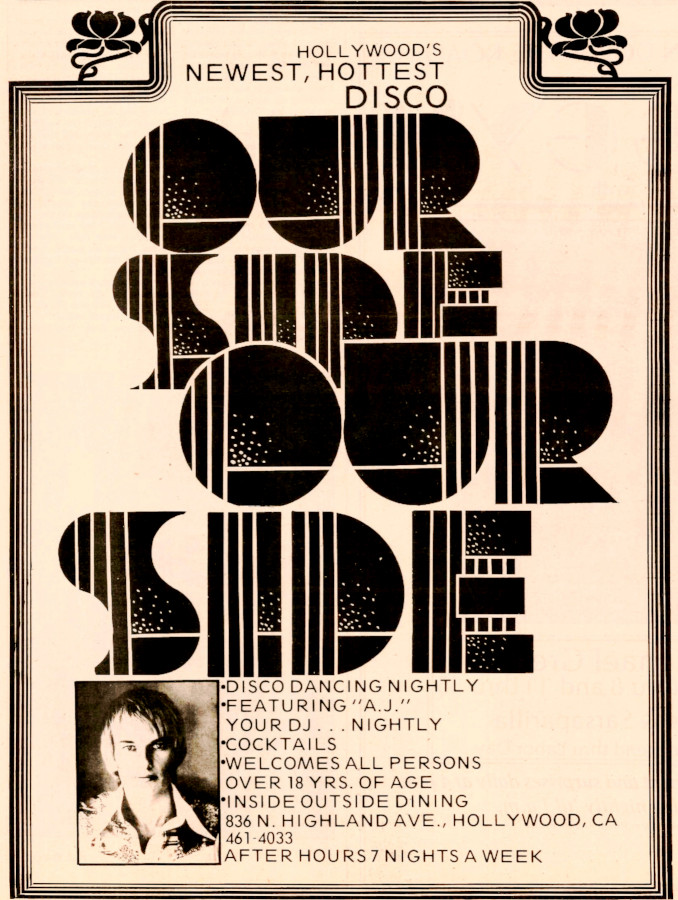
1. Broadway Disco (7507 New Utrecht Ave., Brooklyn, NY): Not much known about this particular venue, though it is curious to see a bar in Brooklyn, far outside the gay ghetto (or Broadway, for that matter) advertised in The Advocate. Currently, an establishment called The El Toro Bar exists at this address today.
2. D.O.K. West (12889 Garden Grove Blvd., Garden Grove, CA): Touted in this ad as "Orange County's NOW Disco," DOK West was part of a hopping gay scene in Garden Grove City which dated back to 1964. For a brief period, gay bars in Garden Grove were said to have outnumbered even those in West Hollywood. Evidently its name was either a reference to DOK (De Odeon Kelder), a major gay venue in Amsterdam or The Wizard of Oz (Dorothy Of Kansas). According to the ONE Archives, DOK West appears to have lasted for 20 or so years, from approximately 1965, closing in either 1986 or 1989. Not surprisingly, DOK West and other venues in the area were frequent targets of police harassment.
3. Our Side (836 N. Highland, Hollywood, CA): Mostly cutting and pasting here from what I wrote in the previous post (Christopher Stone's interview with its DJ, A.J. Miller) - Formerly The Paradise Ballroom and before that, Dude City, both venues reportedly owned by notorious LA underworld figure Eddie Nash. No word on what was the case with it’s brief turn as Our Side, but apparently it was only known as such for a brief period, changing its name back to The Paradise Ballroom after its competition across the street, named The Other Side mysteriously burned down. The venue would also be known as 836 North for a period, eventually becoming Probe in 1978. Probe would last for a good 21 years before closing in 1999.
____________________________________________
PREVIOUS RELATED ENTRIES:
vintage articles: “get dancing” - aj: west coast’s gold-plated dj - by christopher stone // the advocate - august 13, 1975 (tuesday may 11, 2021)
vintage articles: cheap thrills, entertainment and escapism - by christopher stone // the advocate - august 13, 1975 (wednesday may 5, 2021)
vintage articles: wanna dance? get wrecked to the ass! - by vito russo // the advocate - august 13, 1975 (wednesday april 28, 2021)
vintage articles: exclusive supremes interview - by christopher stone // the advocate - august 13, 1975 (sunday march 21, 2021)
CATEGORIES: VINTAGE ARTICLES

No comments:
Post a Comment